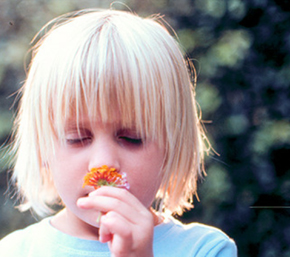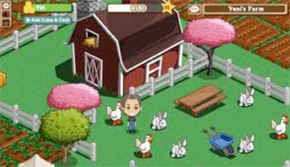


After research and multiple iterations, we came up with "Bloom Garden Sensors", which are interactive water and nutrient sensors that children can install in their backyard. This allows them to understand the planting, growing, and harvesting cycles of the plants, and also keeps them engaged by alerting them to when pests or other problems occur in their garden. The sensors are able to monitor the garden at all times.
video sketch
User Research
Interviews were conducted on a one on one basis with 4 parents with single family houses in the suburbs with backyards.
Our research questions were open ended and allowed them to talk about their own experiences with minimal interview bias.
They were encouraged to think about their daily lives as a family, favorite memories in the backyard, family social activities they most enjoyed, and the daily activities that their children enjoy.
Our participants mostly use the backyard for family get together and celebration.
Most watch movies with the kids in the backyard on a summer day.
Participants usually play with kids in the backyard, such as competitive games, obstacle avoidance, flash cards and scrabble.
Parents often take their children outside of the home, such as to the park or to the childrens' gym.
Participants also arrange playgroups or playmates with other children.
Brainstorming
We conducted a brainstorming session of possible concepts and ranked them in order of feasibility and
importance, but in the end felt it was best to examine them all at once. Certain words would jump out as most interesting or relevant to us, but they were meant to serve only as an initial guide for our design. Ultimately, we decided that we would let our users tell us their needs and stories, rather than becoming to attached to any particular idea.
Many of these 50 concepts can be applied, but not all of them were appreciate by our diverse users. They shared unique perspectives, and we took their diversity and common needs into account in refining our concepts.
Personas

Michael, 7
Student 2nd Grade
Likes reading science fiction and soccer in the park after school with friends. Looks up to his older brother and likes to copy his behavior
Favorite book is Where The Wild Things Are

Sammi, 6
Student 1st Grade
Is fascinated by flowers and her pet rabbit, likes playing with her best friend Michael. Loves to go on road trips with her family to the beach.
Favorite book is If You Give a Pig a Pancake
Inspiration

Farmville
Immediately when thinking of backyards and children, we thought of Farmville. It is a popular and widely recognized game, and many children and adults are involved in playing with one another. We tried to probe into what makes the game so engaging, and how principles of social sharing could be incorporated into our product.

Nokia Communicator 888
We took inspiration from concept phones such as Nokia 888, which allows user to interact with friends and family at all times and acts as a ubiquitous device that the user can wear at all times.
Storyboards
Speed Dating
We conducted speed dating as a means to take users into our proposed scenarios, and allow them to explore their reactions and opinions. In this way, it served as a hybrid of rapid prototyping and iterative design, which allowed us to define and understand the scope of the problems that users were facing.
We spoke with users over the phone while sending them pdf's of our illustrated storyboards. At this point, we asked users what they would do in each scenario, what their children would do, if they thought a scenario was feasible in real life, and other specific questions.
I like the idea more for a kid to track those things and watch nutrient levels. Water is not as tricky. It would be a fun thing to track and know.
I don't want my son monitoring water levels in school when he should be studying.
In the real world, you see it, it is still not growing, still not growing, ok I am gonna play Nintendo now.
I like the idea that if your neighbor is planting something and you're not, you can share.
I think it would be cool to have some system that can tell me when my garden has some pest in advance because it sucks when you lose your plant to bugs or pests.
Having kids share whatever they grow would be interesting to them. Kids would like that.